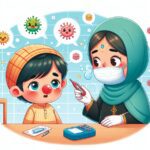Recognizing and responding to baby’s first cold can be a daunting milestone for new parents. The congestion, the coughs, and the fussiness can all seem overwhelming, but understanding the signs and knowing how to provide comfort can make a significant difference. This comprehensive guide will walk you through identifying your baby’s first cold, offering soothing relief, and when it’s time to consult with a healthcare professional.
Understanding the Common Symptoms
Identifying when your baby has a cold is the first step in providing care. Common symptoms include nasal congestion, a runny nose, coughing, sneezing, and sometimes a mild fever. While these symptoms can be concerning, they’re typically manageable at home with the right approach.
It’s crucial to monitor these symptoms closely. If your baby shows signs of difficulty breathing, refuses to nurse or bottle-feed, or has a fever above 100.4°F (38°C), it’s important to seek immediate medical attention. Consulting reliable sources and healthcare advice can provide peace of mind. A helpful resource is the Centers for Disease Control and Prevention (CDC) which offers extensive information on managing colds in infants.
Recognizing and responding to baby’s first cold
Recognizing and responding to baby’s first cold requires patience and attentiveness. The frequency and quality of your baby’s cries can change, indicating discomfort or pain. A decrease in appetite and disturbed sleep patterns are also common indicators that your baby might be experiencing their first cold.
In responding to your baby’s cold, maintaining a comfortable environment is key. Keeping the room at a suitable temperature, using a humidifier to moisten the air, and ensuring your baby stays hydrated are crucial steps. Gentle saline nasal drops can also help relieve nasal congestion. For more comprehensive insights, Navigating Your Baby’s First Cold: Symptoms and When to Call the Doctor offers in-depth advice.
When to Seek Medical Advice
While most colds can be managed at home, certain symptoms warrant immediate medical attention. These include persistent fever, signs of dehydration (such as fewer wet diapers), difficulty breathing, and unusual lethargy. If your baby exhibits any of these symptoms, it’s critical to contact your healthcare provider without delay.
Consulting with a pediatrician can provide specific guidance tailored to your baby’s needs. For additional information on when to seek medical advice, Essential First Aid Skills Every Parent Should Know and Strategies for Safely Managing Fever in Children are valuable resources that can help you prepare and respond effectively.
Recognizing and responding to baby’s first cold is a rite of passage for every parent. By staying informed, observing your baby closely, and taking the appropriate steps, you can ensure their comfort and recovery. Remember, when in doubt, always consult with a healthcare professional to provide the best care for your little one.
For more tips on keeping your baby healthy and safe, be sure to explore our articles on Choosing the Safest Baby Car Seats for Newborns, Safe Sleep Practices to Reduce the Risk of SIDS, and Breastfeeding Challenges: Mastitis Symptoms and Treatments for comprehensive guides to baby care.













